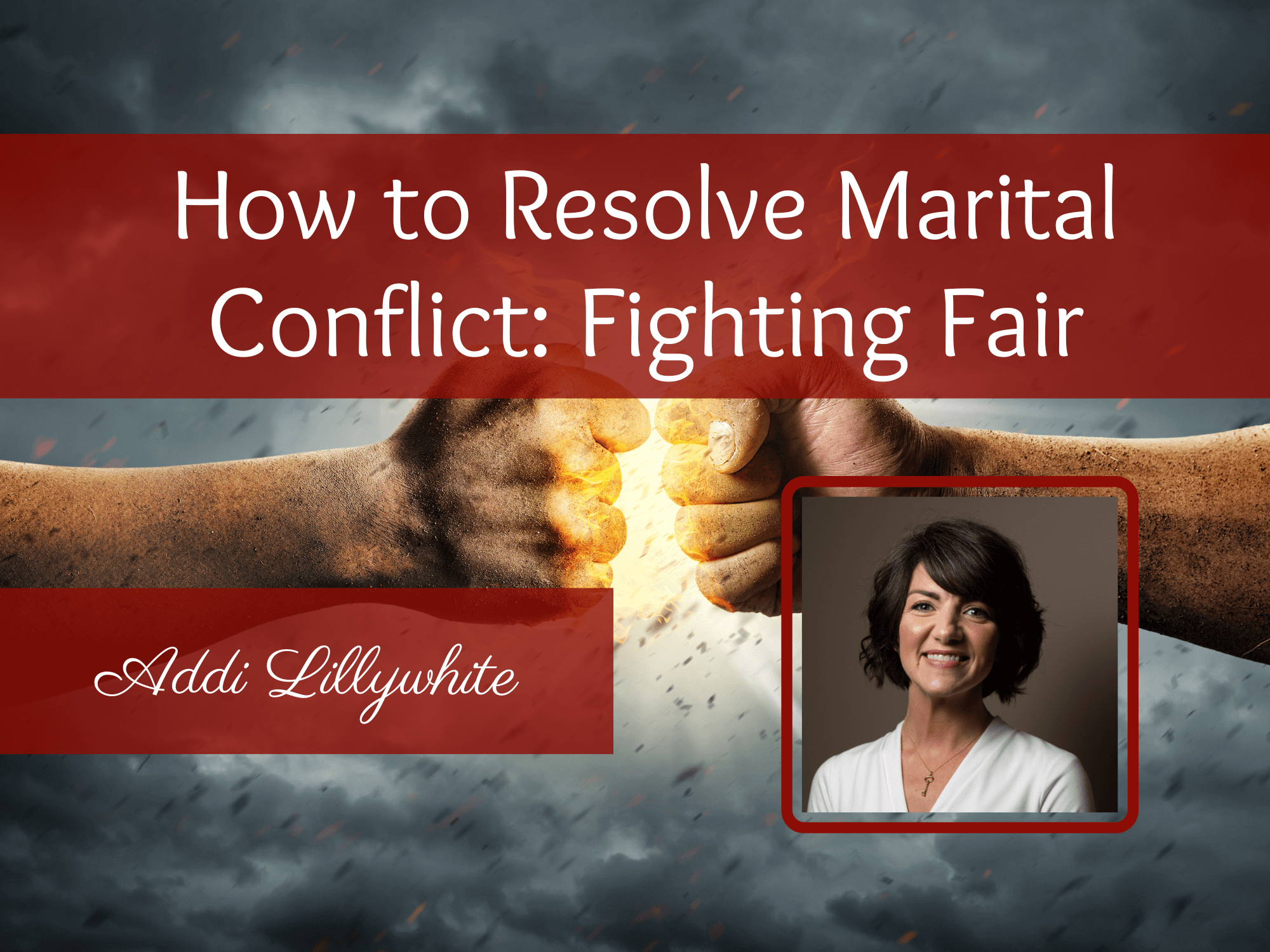Are you constantly getting in blow-up fights with your partner about small, dumb things? Most likely, there is a bigger underlying issue breaking through the surface. It could also be the way you approach your partner that causes them to react defensively, leading to a more intense argument.
Does this mean your marriage is doomed for divorce? No, it just means you need to better understand your partner’s values, thoughts, feelings, and opinions on the topic of your conflict.
To learn more about resolving marital conflict, we brought back Addi Lillywhite, intern at Kenosis. She holds an undergraduate degree in marriage and family studies and is currently working towards her master’s degree in marriage and family therapy. In this article, Addi touches on the best way to communicate through conflict, fighting fair in marital disputes, and when to see a marriage counselor.
Gottman’s Four Horsemen of the Apocalypse
Relationship expert Dr. John Gottman identified four common problems in marital conflict, known as The Four Horsemen of the Apocalypse. They are criticism, defensiveness, contempt, and stonewalling. Addi says she sees those four behaviors at one time or another in all couples counseling sessions.
These four behaviors commonly build upon each other; one leads to the next. Addi explains, “Criticism is how we approach a subject that’s bothering us. We can point out all of the negative traits in somebody else. There’s a lot of blame and shame around that. Then as soon as somebody does that, we tend to respond with defensiveness. Once the defensiveness happens, the contempt starts, which is eye-rolling, hateful comments, sarcasm, or maybe a heavy sigh. When that goes on for longer and longer, the stonewalling sets in.” These behaviors are forerunners of serious marital issues and possibly divorce. The goal is to avoid this sequence of events and instead, approach your partner intentionally.

Setting Boundaries and Expectations
To avoid the cycle of The Four Horsemen of the Apocalypse, each partner needs to respect the boundaries of the other person. If you don’t know what your boundaries are, take the time to explore and figure them out. Until you know your personal boundaries, you can’t expect your partner to know or respect those boundaries. “Neither partner has perfected their mind-reading skills yet,” Addi jokes. If you already know your boundaries, have that conversation as soon as possible.
Of course, boundaries vary by person but here are a few examples of healthy boundaries to set within your relationship:
- Emotional boundaries: Being clear on what is or isn’t yours to feel
- Intellectual boundaries: Respecting others beliefs, ideas, and values
- Physical boundaries: Relaying your comfort regarding physical touch
- Financial boundaries: Recognizing your comfort level around saving and spending
Addi reminds us, “It can be a continual process. Just because you married somebody and their boundary was one thing in the beginning, doesn’t mean it stays that way. Take the time to understand where they are currently, because they may or may not be the same as they were.” Life experiences and the stage of life we’re in can influence our boundaries. Understanding where your partner is at is key to working through conflict with them.
Approaching Your Partner in Marital Conflict
You should always approach your partner calmly. If you’re already feeling worked up, it’s not the right time to bring up the issue. In the heat of conflict, you aren’t thinking clearly. Addi advises, “If the conflict begins and you find yourself feeling too emotional, take a 20-minute break to calm down. During that 20 minutes, it’s not a time to go and sit in the other room and stew about why you’re so mad at your partner. It’s time to take a little break from it and not think about it for 20 minutes. Let yourself think about something else and then revisit it.” In case you’re wondering, we don’t suggest 20 minutes as an arbitrary amount of time; it’s actually how long it takes the body to calm down from a stage of physiological agitation.
Addi also reminds her clients that they are fighting with a friend and the person they’re married to, not an enemy. “A lot of times, people tend to go into it like they’re fighting this opposing team or this person that’s your enemy. In reality, you’re on the same team trying to figure out the best play to help you win the game.”

Fighting Fair
An argument is a chance to understand your partner on a deeper level. You’re giving the other person a chance to state their side of the argument and their feelings. Validate their feelings, thoughts, ideas, and opinions to better understand where they’re coming from.
Addi mentions, “I think it’s important to understand why they’re coming from that place. You don’t have to agree with it to understand them. They have a reason why that’s where they stand, and if we know that, we understand them even better. That’s the fairest thing I think we could do to the person we’re fighting against, is understand what they’re fighting for and why they’re fighting for it.” There is more than one way to do everything. Coming into the conversation empathetically can help you see your partner’s side.
Addi believes most conflicts are based on a misunderstanding. The biggest misunderstanding she sees is people thinking they’re fighting about small things, when actually, those small fights are covering up a bigger conflict of values that’s fueling the fire.
She shares an example: “I had a couple get in a huge fight about bagels and cream cheese. They were shopping at the store, and as she was checking out, she realized she forgot to get cream cheese for blueberry bagels, so she sent her husband back to get it. He comes back up front with sour cream and chive cream cheese. She’s like, ‘What on earth did you do? I should have known not to send you because I am not putting chive cream cheese on my blueberry bagels.’ They just blew up over it, but it was so ridiculous. They couldn’t understand why bagels might be the thing that ends their relationship. But it’s not really about the bagel. It’s [about how she felt] when he came back up. She’s like, ‘I feel like he didn’t even listen to me. He knows that I don’t like that. He wasn’t paying attention to what I had purchased. He doesn’t listen when I talk, he doesn’t pay attention to what I do, and he doesn’t care about what I like.’ And he’s like, ‘Well, she never trusted me to make my own choice. She never lets me go and pick what I want or trust me to make the right decision, so I don’t know how to do it.’ So it’s really about not feeling heard and not feeling trusted, not about bagels.”
As silly as this story is, it’s not uncommon for couples to blow up over little things. You can probably think of a similar situation in your relationship. The core fight is about not understanding the other’s perspective and feelings.

How to Know It’s Time for Marriage Counseling
Addi says, “If you’re wondering if it’s time to see a therapist, it probably is.” You don’t have to be ready to get divorced to see a professional. Counseling can be a time to get back on the same page and update your approach to a healthy marriage.
A marriage counselor can offer education, skills, and practical approaches to resolving conflict. She comments, “It doesn’t have to be all the touchy-feely stuff that some people are afraid of when they go to therapy. Somebody can look at [your conflict] completely unbiasedly and say, ‘Oh, I think I see where you went wrong there. If you just tweak this a little bit more, it might go a little bit better for you.’” A third-party perspective on your marital conflict can be enormously beneficial to your relationship.
Addi closes with, “All couples fight. If a couple tells you that they don’t fight, they’re either lying to you, or they’re lying to themselves. We aren’t trying to create perfect couples that don’t fight. We’re just trying to make couples that can have conflict successfully.” You will always have disagreements with your partner, but at the end of the day, you’re friends, and you’re on the same side.

